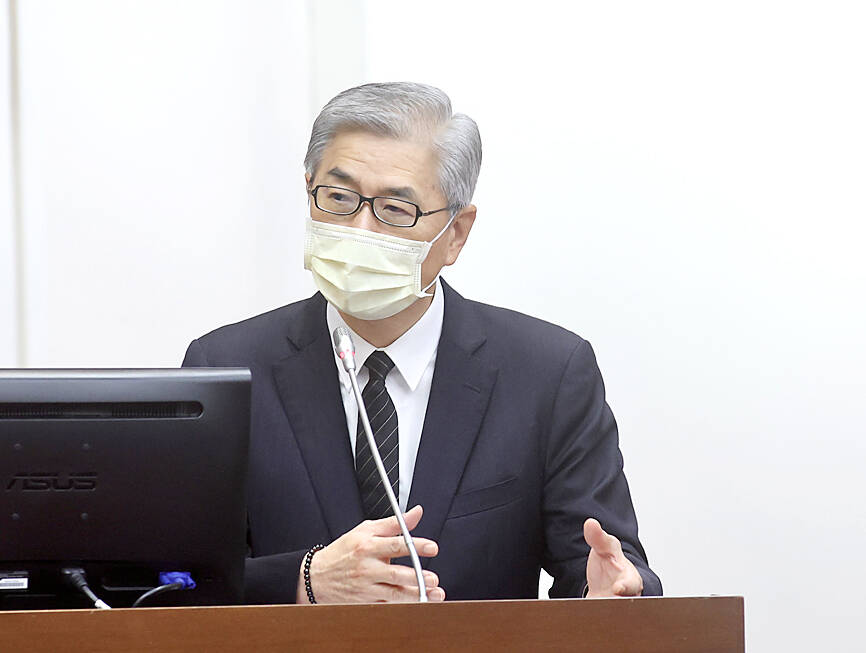The Financial Supervisory Commission (FSC) yesterday asked local banks and financial services providers to closely monitor their use of artificial intelligence (AI) tools such as ChatGPT, to protect data security.
The FSC told the Bankers’ Association (銀行公會) to investigate how many banks are using AI tools, how they use them and whether they have set risk controls, and to complete the review in two months.
Meanwhile, the Securities and Futures Bureau said it would investigate whether local securities companies have incorporated AI tools into their services, bureau Deputy Director Kao Ching-ping (高晶萍) told the Taipei Times by telephone yesterday.

Photo: CNA
Lawmakers on Thursday questioned whether the FSC was aware of the potential hazards involved in the use of large-language models, commonly referred to as AI.
No foreign financial regulator has taken a clear stance on the issue, although the Hong Kong Monetary Authority said the issue would eventually be discussed by international agencies, such as the Bank for International Settlements, FSC Chairman Thomas Huang (黃天牧) told legislators.
The FSC would research the risks to consumers first and decide how to set a framework, Huang said.
Banks seeking to use ChatGPT might risk data leaks, as they would be using customer information to interact with the software, which could incorporate that information into its own database, Banking Bureau Director-General Sherri Chuang (莊琇媛) said.
Even if banks use a special version of a large-language model for business, they should be aware of the data security risks and take precautions, Chuang said.
The Securities and Futures Bureau is unaware of any local securities company using ChatGPT as part of their equity research or customer service, but it would seek to confirm that, Kao said.
“There is no regulation banning securities companies from using new technology tools, but if the companies want to utilize the bot [ChatGPT], they must prevent data insecurity and be responsible for any financial advice they give to their clients, whether the advice based on their employees’ judgements or that of bots,” Kao said.
With ChatGPT gaining popularity worldwide, experts have been discussing whether it would replace financial services provided by humans, as the tool could analyze vast volumes of data quickly, and detect patterns and trends difficult for a person to spot.
However, when asked for advice on investing in local companies, the chatbot gave a neutral and conservative response.
It said that it cannot provide investment advice, which requires a thorough understanding of the investor’s financial situation, risk tolerance, investment goals and other factors.
Although some shares have performed well in the past, that performance is not a guarantee of future results, it added.

Auckland rang in 2026 with a downtown fireworks display launched from New Zealand’s tallest structure, Sky Tower, making it the first major city to greet the new year at a celebration dampened by rain, while crowds in Taipei braved the elements to watch Taipei 101’s display. South Pacific countries are the first to bid farewell to 2025. Clocks struck midnight in Auckland, with a population of 1.7 million, 18 hours before the famous ball was to drop in New York’s Times Square. The five-minute display involved 3,500 fireworks launched from the 240m Sky Tower. Smaller community events were canceled across New Zealand’s

The Ministry of Foreign Affairs (MOFA) yesterday said it is closely monitoring developments in Venezuela, and would continue to cooperate with democratic allies and work together for regional and global security, stability, and prosperity. The remarks came after the US on Saturday launched a series of airstrikes in Venezuela and kidnapped Venezuelan President Nicolas Maduro, who was later flown to New York along with his wife. The pair face US charges related to drug trafficking and alleged cooperation with gangs designated as terrorist organizations. Maduro has denied the allegations. The ministry said that it is closely monitoring the political and economic situation

‘SLICING METHOD’: In the event of a blockade, the China Coast Guard would intercept Taiwanese ships while its navy would seek to deter foreign intervention China’s military drills around Taiwan this week signaled potential strategies to cut the nation off from energy supplies and foreign military assistance, a US think tank report said. The Chinese People’s Liberation Army (PLA) conducted what it called “Justice Mission 2025” exercises from Monday to Tuesday in five maritime zones and airspace around Taiwan, calling them a warning to “Taiwanese independence” forces. In a report released on Wednesday, the Institute for the Study of War said the exercises effectively simulated blocking shipping routes to major port cities, including Kaohsiung, Keelung and Hualien. Taiwan would be highly vulnerable under such a blockade, because it

UNRELENTING: China attempted cyberattacks on Taiwan’s critical infrastructure 2.63 million times per day last year, up from 1.23 million in 2023, the NSB said China’s cyberarmy has long engaged in cyberattacks against Taiwan’s critical infrastructure, employing diverse and evolving tactics, the National Security Bureau (NSB) said yesterday, adding that cyberattacks on critical energy infrastructure last year increased 10-fold compared with the previous year. The NSB yesterday released a report titled Analysis on China’s Cyber Threats to Taiwan’s Critical Infrastructure in 2025, outlining the number of cyberattacks, major tactics and hacker groups. Taiwan’s national intelligence community identified a large number of cybersecurity incidents last year, the bureau said in a statement. China’s cyberarmy last year launched an average of 2.63 million intrusion attempts per day targeting Taiwan’s critical